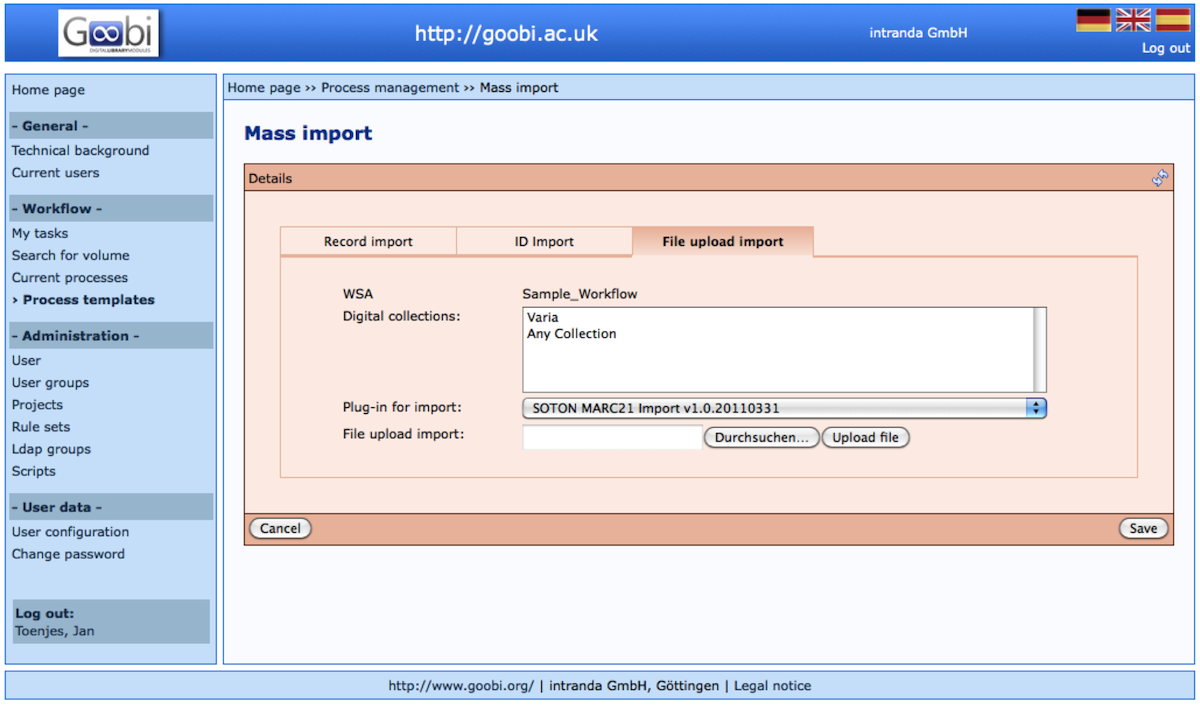General improvements
Plug-in interface
By installing special plug-ins for individual users, Goobi 1.8 made it easier to perform institution-specific changes in different areas without changing the core of the application.
Hotfolder mechanism
In order to automate the import process as far as possible, Goobi 1.8 came with a hotfolder mechanism that allowed users to import metadata and generate Goobi processes. Based on a dedicated configuration file, imports could now be performed automatically by adding metadata files to a configured directory.
Important note: This hotfolder mechanism was removed in Goobi Version 1.9 and replaced by an improved import mechanism based on a plug-in.
Batch import for bibliographic data
Goobi 1.8 contained a dynamically extendable mechanism for importing a huge range of metadata based on the plug-in interface. Depending on the implementation of the plug-ins, they are listed with the corresponding process templates in the area of the the newly created mass import. They allow users to upload or insert identifiers or metadata in the GUI interface and to import data and generate Goobi processes on a fully automated basis. The plug-ins can be exchanged for other versions at any point while Goobi is running without having to restart the application. Every import plug-in being used in Goobi has to be located at a specific point in the root directory. All Goobi import plug-ins are located on the following path in the file system:
/opt/digiverso/goobi/plugins/import/
Each individual plug-in can be compiled and made available as a *.jar file. Several plug-ins can be compiled together and made available to Goobi in a *.jar file.
/opt/digiverso/goobi/plugins/import/MySingleImportPlugin.jar /opt/digiverso/goobi/plugins/import/MyMultiImportPluginCollection.jar
Improved back-up functionality
The system of generating back-ups for METS files was revised in Goobi 1.8. This ensured the counting and completeness of back-ups and avoided potential misunderstandings over the stored back-up files and their names.
Command line improvements
Goobi 1.8 contained several new commands to call external programs in addition to those already in place in the command line version of Goobi.
Important note: This command-line mode was removed in Goobi Version 1.9 and replaced by an improved Web API mechanism based on a plug-in.
Batch import for MARC21
As part of a range of projects, a new import plug-in was implemented for batch importing of files in Marc21 format. Once installed, the the new plug-in was available for all workflow templates.
Supported import types:
Record: Plain text MARC21 datasets (one or more datasets in a single file)
File: *.mrc files (e.g. as generated by MarcEdit)
Batch-Import für Pica+/Pica3
As part of a range of projects, a new import plug-in was implemented for batch importing of files in Pica+/Pica3 format. Once installed, the the new plug-in was available for all workflow templates.
Supported import types:
Record: Plain text PICA datasets (one or more datasets in a single file)
Batch import for PPN lists
As part of a range of projects, a new import plug-in was implemented for batch importing of data requested from a Pica catalogue. The plug-in’s web display contains a list of the PPNs to be imported from the catalogue. Once installed, the new plug-in was available for all workflow templates.
Supported import types:
ID: inserting one or more identifiers separated by line breaks
Batch import for Mods
As part of a range of projects, a new import plug-in was implemented for batch importing of files in MODS format. Once installed, the the new plug-in was available for all workflow templates.
Supported import types:
File: MODS-xml files
UCC compatibility
As part of the process of establishing the universal capturing client, which also acts as an alternative metadata editor for Goobi, an additional function was implemented providing direct communication with Goobi. This allows scan operators to work directly with Goobi’s upload mechanisms.
Web API
Version 1.8 came with a web interface based on the command line version of Goobi that allows users to call Goobi commands externally via URLs. All command line instructions are available in the Web API. To protect the data, individual commands can be restricted to special IPs or IP areas.
Example call:
http://intranda.com/goobi/wi?command=myCommand&token=mySecretPassword
Improved statistics functionality
A number of improvements were made in the areas of statistical requests to allow for more effective use of the results. The improvements mainly concerned diagram headings and labels but also the option to download data as Excel files from the tables generated by Goobi.
Encoding improvements within metadata and for PICA imports
Metadata processing in Goobi was improved with particular regard to the handling of Pica datasets. This involved changes to the masking of special characters from Pica catalogues to improve subsequent processing.
Double page allocation of sub-elements resolved
Previous instances of multiple allocation of page assignments to structural elements were resolved in this new version of Goobi.
Other general improvements
A number of changes were made in different areas of the program to improve its performance. These included general coding improvements and more effective storage management.
Formats
ALTO as OCR format
ALTO format was added as part of the fully automated OCR process for subsequent processing. Depending on the OCR engine being used, OCR results can now be delivered in ALTO format with an option for export to the presentation system (e.g. Goobi viewer).
TEI as OCR format
TEI format was added alongside ALTO as part of the fully automated OCR process for subsequent processing. Depending on the OCR engine being used, OCR results can now be delivered in TEI format with an option for export to the presentation system (e.g. Goobi viewer).
Goobi
Latest Release Notes
System requirements
| Operating system: | Linux |
| RAM: | 4 GB |
| CPU: | 4 cores |
| Hard disk: | 40 GB for operating system plus required data storage |
Get the software
| Source code: | GitHub Repository |
| Documentation: | Goobi workflow Manual |
| Installation: | On request |




Comments are closed.